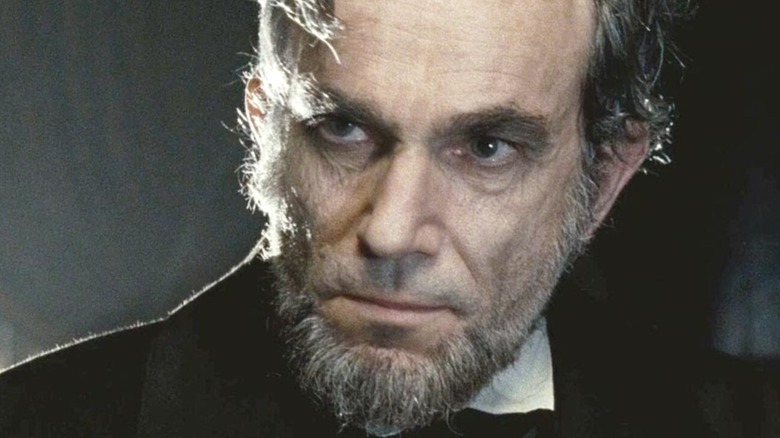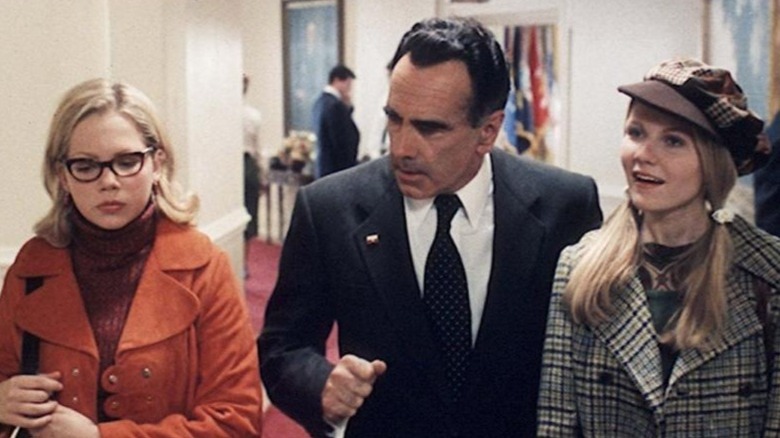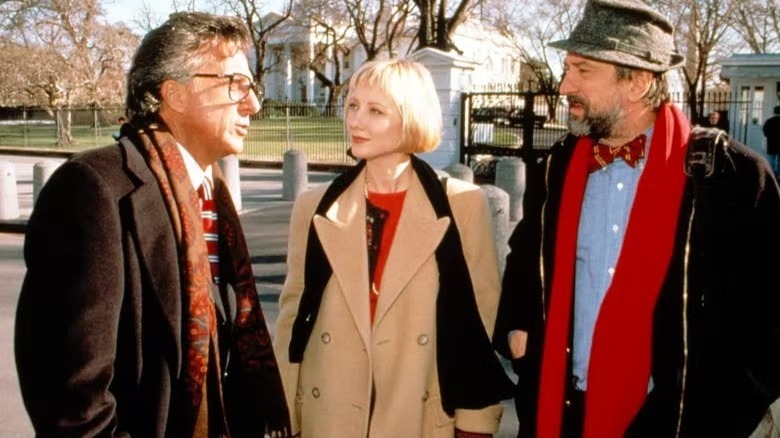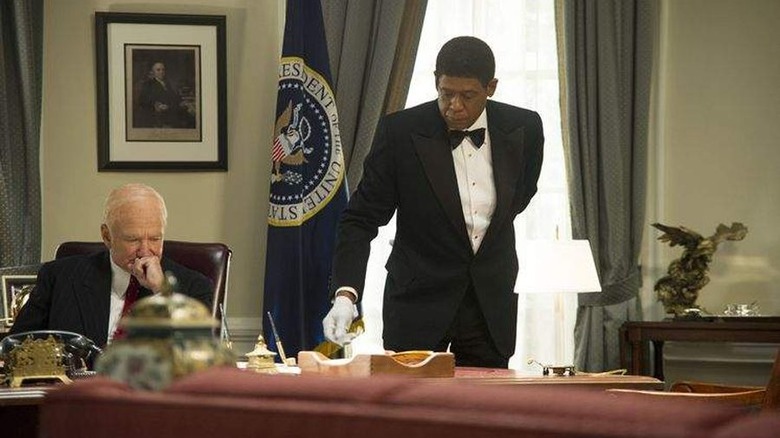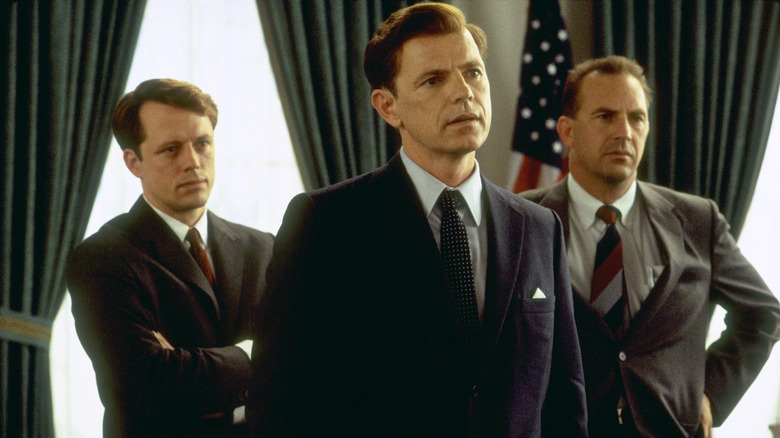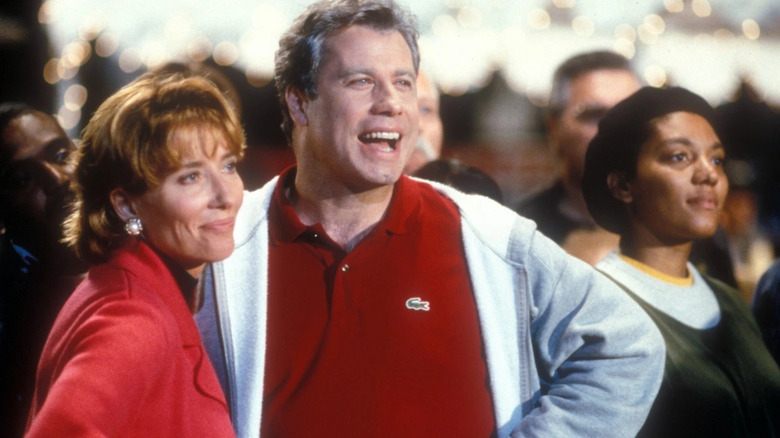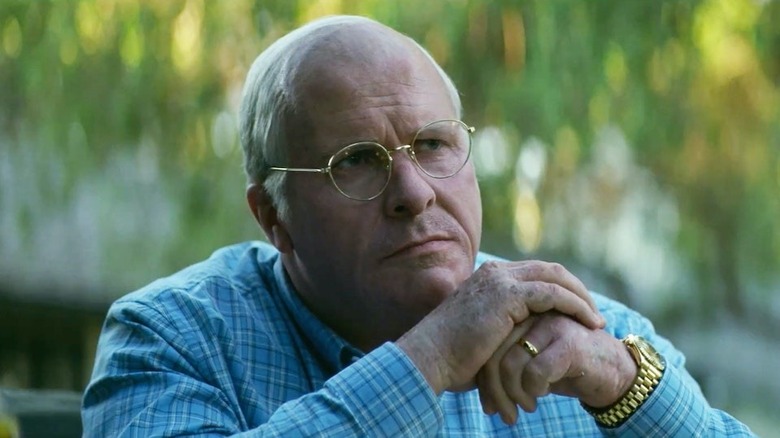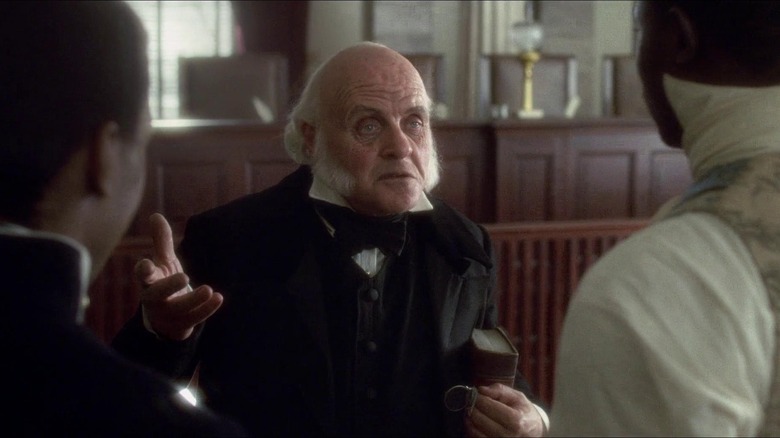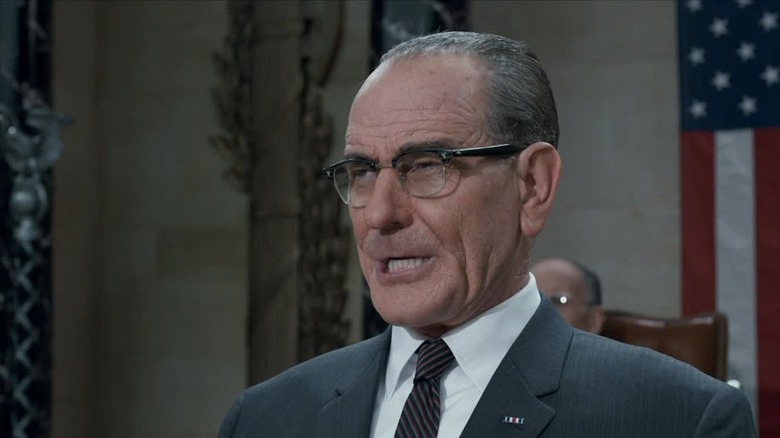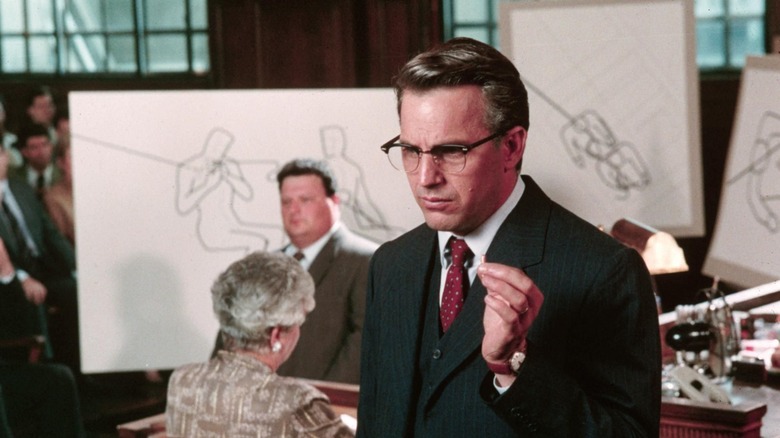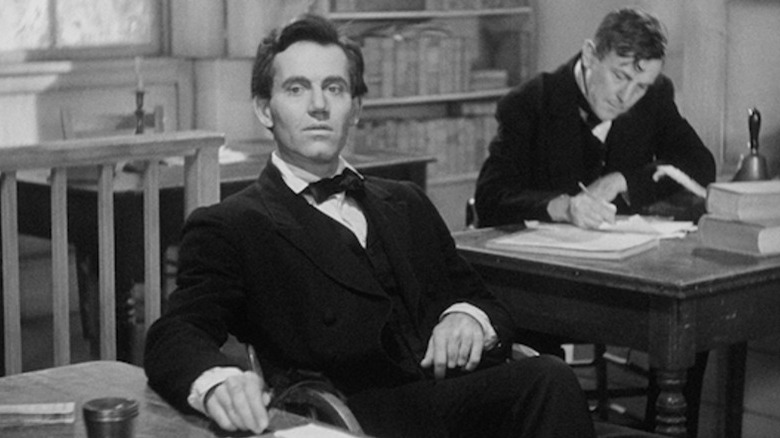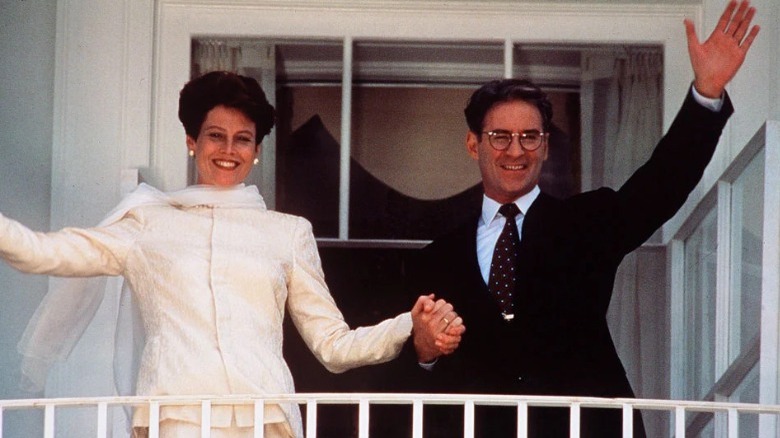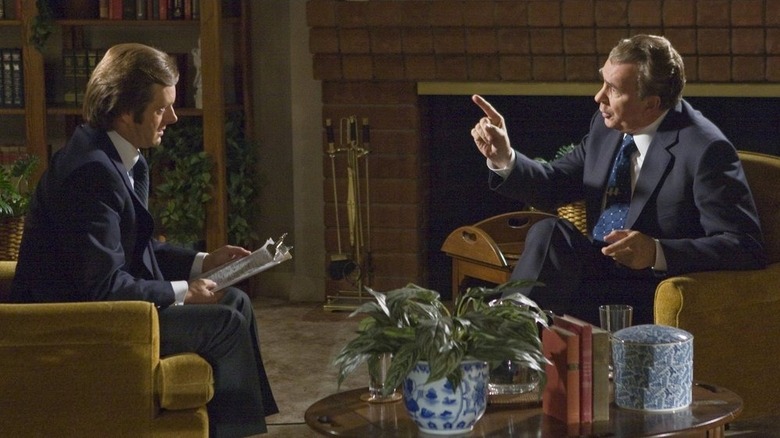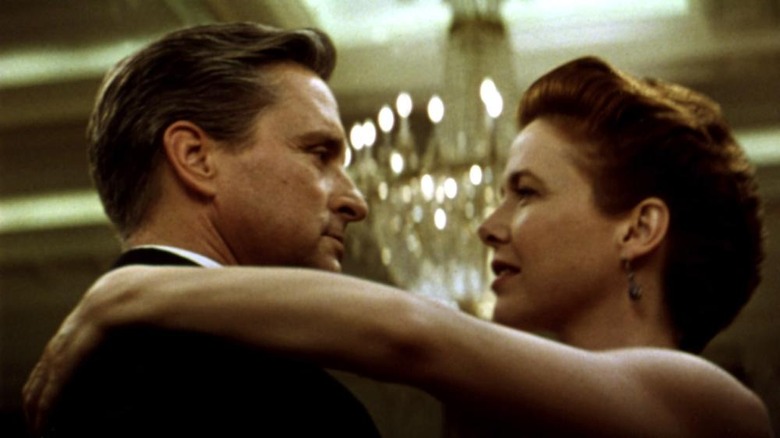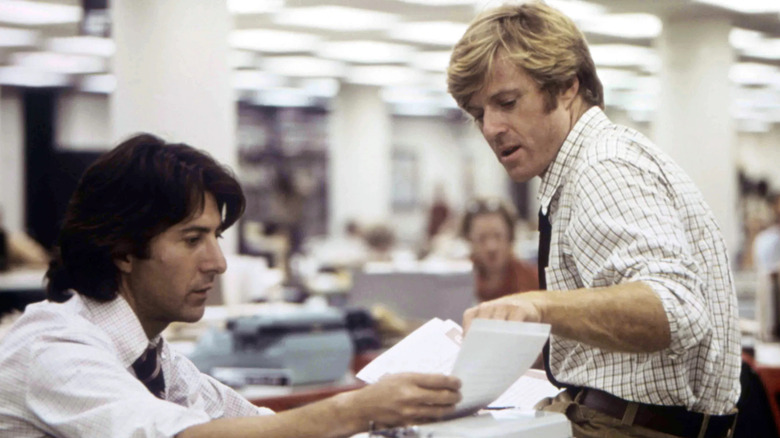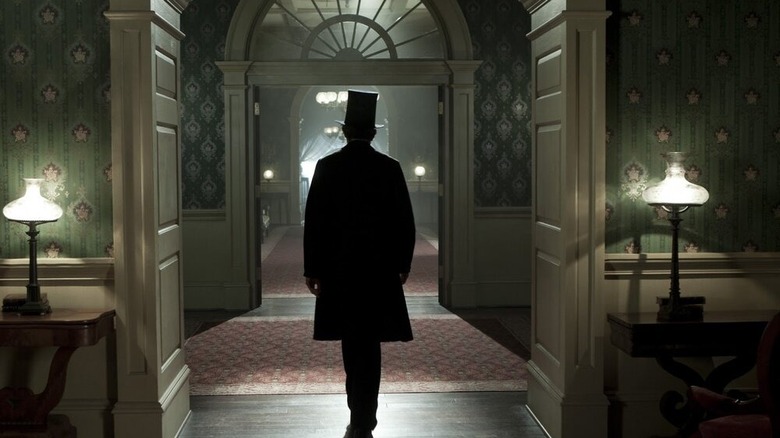The 15 Best Movies About American Presidents You Should Watch
The president of the United States is perhaps the most influential position in the world, as their handling of American policy can define the course of history. The significance and uniqueness of this perspective have led to a number of films focused on the office and life of the president, depicting both real and fictional figures serving as commander in chief. Whether it be political thrillers examining abuses of absolute power or satirical comedies poking fun at the nature of presidential administrations, movies about American presidents have run the gamut of genre and tone.
There's always a special quality to presidential movies, with many actors turning in career-elevating performances while filmmakers craft acclaimed work in depicting the highest elected office in the land. With a multitude of movies about American presidents, here are the best, either focused on the presidents themselves or those exploring those presidential legacies that shake the country to its core.
Dick
The scandal-ridden Nixon administration is one of the more embarrassing periods of the American presidency, and the 1999 comedy "Dick" has lots of fun with the controversial world leader. After teenagers Betsy Jobs (Kirsten Dunst) and Arlene Lorenzo (Michelle Williams) accidentally expose the Watergate break-in, Richard Nixon (Dan Hedaya) personally hires the two girls to ensure their silence in the resulting investigation. As the two girls work among Nixon's inner circle, they gradually discover his true nature and decide to bring the morally unscrupulous president down with their insider knowledge.
"Dick" essentially reimagines the Watergate scandal as a teen comedy from the perspective of two young girls, playing the Nixon administration like buffoons. The filmmakers and Hedaya play Nixon as a paranoid and prejudiced goofball, outsmarted by those working inside the White House right under his nose. The blend of coming-of-age comedy and political thriller works well, lampooning the executive corruption at every turn to great effect.
Wag the Dog
Sometimes life truly does imitate art, and one key example of this is the 1997 political satire film "Wag the Dog," and its timing with subsequent scandals plaguing the Clinton administration. The movie has its fictional president involved in a sex scandal during the final stretch of his reelection campaign, prompting the administration to desperately search for a distraction. presidential aide Winifred Ames (Anne Heche) hires Hollywood producer Stanley Motss (Dustin Hoffman) and professional spin doctor Conrad Brean (Robert De Niro) to fabricate a war in Albania to divert the press' attention.
"Wag the Dog" is a film that isn't afraid to go murderously dark with its satire, showing the lengths a president will go to stay in power, and how fickle the media's attention can be. The movie's all-star cast delivers strong performances and the comedy comes from a place that doesn't ever feel too detached from reality. The movie's message took on a prescient note when President Bill Clinton's affair with Monica Lewinsky became public the next month, followed by the administration bombing military targets in Sudan.
The Butler (2013)
Behind every president is an entire staff that helps make the executive branch possible. One consistent presence across multiple administrations was Eugene Allen, a butler who worked in the White House for decades. A facsimile of Allen is the subject of the 2013 historical drama "The Butler," starring Forest Whitaker as White House butler Cecil Gaines. Hired to work at the White House during the Eisenhower administration, Gaines serves multiple presidents before resigning during the Reagan administration.
Whitaker is joined by a stacked cast, with everyone from Robin Williams as Dwight D. Eisenhower to Alan Rickman as Ronald Reagan, as the film follows Gaines' life and career progress for much of the 20th century. However, the true standout really is Whitaker, who brings an understated humanity while Gaines works, cutting loose with the emotional drama of the butler's home life. A quiet examination of the White House and the presidents who inhabited it from the perspective of its noble and dedicated help, "The Butler" is an engaging tour of American history.
Thirteen Days
The biggest test the Kennedy administration ever faced was the Cuban Missile Crisis in 1962, nearly leading to nuclear war between the United States and the Soviet Union. The events surrounding the crisis and its tense resolution are dramatized in the 2000 film "Thirteen Days," based on the 1997 book "The Kennedy Tapes: Inside the White House During the Cuban Missile Crisis" by Ernest R. May and Philip D. Zelikow. Directed by Roger Donaldson, "Thirteen Days" plays out like a taut thriller, with the fate of the world hanging in the balance of the real-life historical event.
Bruce Greenwood stars as President John F. Kennedy, with Steven Culp playing the president's brother and U.S. Attorney General Robert Kennedy. As the two brothers negotiate with Soviet leadership to remove its nuclear missiles from Cuba to avert a world war, complications arise to heighten the immense tension. Tightly paced, the movie earned the seal of approval from Kennedy's Secretary of Defense Robert McNamara who, in an interview with PBS, called the film "very constructive and responsible" in its depiction.
Primary Colors
While politics comes with an allure of idealism and civic duty, the darker reality of the career path and the types of personalities it attracts is the subject of the 1998 comedy-drama "Primary Colors." Based on the 1996 novel of the same name by Joe Klein, the movie follows bright-eyed staffer Henry Burton (Adrian Lester) who works for presidential candidate Governor Jack Stanton (John Travolta). Initially impressed by Stanton and his platform, Burton becomes disillusioned with the candidate and the political process the more he gets to know the governor.
A thinly veiled roman à clef of President Bill Clinton and his 1992 campaign for the presidency, "Primary Colors" is a biting end-of-innocence with political stakes. Venturing into decidedly dark comedy, "Primary Colors" is political satire at its most cynical, eagerly delving into the ugly side of elected office at the federal level. An impressively performed film with a nuanced look at the realities of political campaigning, "Primary Colors" subtly keeps its tongue-in-cheek as it skewers larger-than-life presidential personas.
Vice (2018)
Academy Award-winning filmmaker Adam McKay focused on the life and legacy of Vice President Dick Cheney, a prominent member of George W. Bush's presidential administration, in the 2018 film "Vice." Starring Christian Bale in a transformative performance as Cheney, the movie charts the Vice president's career culminating in him accepting an offer from George W. Bush (Sam Rockwell) to serve as his running mate. In exchange for joining the administration, Cheney successfully negotiates overseeing several key executive duties within the federal government, which grow in the aftermath of the 9/11 tragedy.
McKay brings his signature sense of self-aware satire to "Vice," complete with Cheney occasionally breaking the fourth wall to address the audience directly about the narrative. Though the response to the film and its portrayal of real-life events proved divisive, Bale's performance as Cheney was praised, earning him an Academy Award nomination for best actor. Packing a decidedly sharp bite with its satirical comedy, "Vice" isn't afraid to get outright nasty with its protagonist and his morally ambiguous role in historical events.
Amistad
Filmmaker Steven Spielberg examined the post-presidential life of John Quincy Adams and his role in a real-life 1841 Supreme Court case in the 1997 film "Amistad." The legal drama stars Anthony Hopkins as the former president, who is called to the courtroom for his legal expertise in a court case that will serve as a prelude to the American Civil War. Among the high-profile figures opposing Adams' legal defense is current President Martin Van Buren (Nigel Hawthorne) as the case garners national attention.
"Amistad" tells the incredible true story of a Spanish slaver ship that was overtaken by the contingent of trafficked personnel it was transporting from Africa to the United States to sell into slavery. Intercepted and taken into custody by the Americans, a court case regarding the would-be slaves' fate reaches the Supreme Court, with Adams representing the Africans to argue for their freedom. An excellent showcase for its cast, including Morgan Freeman and Djimon Hounsou, "Amistad" combines legal thriller with historical political drama that depicts Adams continuing to shape national policy, remaining an advocate for human rights beyond his presidency.
All the Way
After a successful Broadway run, the stage play "All the Way" by Robert Schenkkan was adapted into an HBO television film in 2016, with Bryan Cranston reprising his starring role as President Lyndon Baines Johnson. As Johnson plans to run for reelection in 1964, the United States becomes drawn deeper into the Vietnam War while the administration pushes for a legislative agenda combating national poverty. As Johnson balances these issues, he realizes he cannot ignore working on the Civil Rights Act as Martin Luther King Jr. (Anthony Mackie) raises its profile through national activism.
As he did on Broadway, Cranston portrays Johnson as a man suddenly thrust into the highest office in the land following the Kennedy assassination at one of the most pivotal moments in American history. "All the Way" covers a tremendous amount of breadth from the first term of the Johnson administration but director Jay Roach guides the story along at an engaging and easy-to-follow pace. Backed by an impressive cast, Cranston fully inhabits the role of Johnson, painting the portrait of a leader overwhelmed by mounting responsibility and a growing agenda that could collapse with one false step.
JFK
The country was shocked when President Kennedy was assassinated in November 1963, abruptly ending an era of renewed idealism before the late leader could complete his first term in office. A grieving nation searched for answers, with numerous conspiracy theories arising that the assassination may have been a secret government coup orchestrated at the highest levels. One of the earliest conspiracy theories surrounding the suspicious elements of Kennedy's murder is the focus of the 1991 political thriller "JFK," directed, produced, and co-written by Oliver Stone.
New Orleans District Attorney Jim Garrison (Kevin Costner) investigates local links to the Kennedy assassination that suggest suspected killer Lee Harvey Oswald had help from inside the federal government. Though "JFK" faced controversy upon its theatrical release for its depiction of Garrison's investigation and things it omitted from the true story, the quality of the film itself was widely praised, earning it an Academy Award nomination for best picture. A slow-burn political thriller that culminates in a tense courtroom drama, "JFK" is Stone leaning into his storytelling strengths to search for answers behind America's most public murder.
Young Mr. Lincoln
Long before Abraham Lincoln became the 16th president of the United States, he worked as a trial lawyer in Illinois before shifting his career focus to politics. Lincoln's legal career is explored in the 1939 film "Young Mr. Lincoln," starring Henry Fonda as the future president. It's a movie that serves as both a biography and a courtroom drama. The story revolves around a famed murder case in 1858 that saw Lincoln successfully defend a man accused of murder using an almanac, though "Young Mr. Lincoln" takes significant creative liberties.
"Young Mr. Lincoln" follows the eponymous protagonist as he starts his law practice in Springfield, Illinois, and falls in love with his future wife Mary Todd (Marjorie Weaver). Lincoln's first major case has him defend two young brothers accused of stabbing a man to death, with an eyewitness claiming to have seen the murder occur. With Fonda's earnestly driven performance elevating the entire film, "Young Mr. Lincoln" is a briskly paced biopic that focuses on a key moment in the president's early life.
Dave
The 1993 political comedy "Dave" brought an everyman perspective to the Oval Office, with star Kevin Kline pulling double duty as fictional President William Harrison Mitchell and his unassuming doppelganger Dave Kovic. Kovic is hired by the Secret Service to publicly impersonate President Mitchell to cover up the commander in chief's extramarital affairs, only to find himself center stage when Mitchell suffers a stroke. With the public unaware of the switch, Dave's more amiable personality and visible compassion change the perception of the White House while Dave grows closer to first lady Ellen Mitchell (Sigourney Weaver).
Under Ivan Reitman's reliably solid direction and an understated sense of humor and charm, "Dave" is the perfect cinematic antidote to political cynicism. Kline's performance as the titular protagonist is a reminder that absolute power needn't always corrupt. He also has magnetic chemistry with Weaver on-screen. A gentle subversion of political dramas fueled more by sentiment than pointed satire, "Dave" is a rare feel-good political film.
Frost/Nixon
Though Nixon was exposed for his role in the 1972 Watergate scandal, he was pardoned from all wrongdoing by subsequent President Gerald Ford, forcing the country to move on. One journalist who refused to let the controversy rest was British television host David Frost, who set out to grill Nixon in a series of publicly broadcast interviews. The interviews and the events behind them are dramatized in the stage play "Frost/Nixon" by Peter Morgan, which was adapted into a 2008 film of the same name by filmmaker Ron Howard.
Micheal Sheen and Frank Langella play Frost and Nixon, respectively, reprising their roles from the original Broadway and West End stage productions. The two characters verbally spar with one another as they try to take control of the televised conversation, each determined to make this interview one that will serve as the definitive epilogue to the Nixon presidency. Tautly paced and with Sheen and Langella at the height of their powers, "Frost/Nixon" provides a candid look at Nixon as he reflects on his presidential legacy.
The American President
Before creating the long-running presidential television series "The West Wing," screenwriter Aaron Sorkin told a much different White House-centric story with the 1995 feature film "The American President." Directed and produced by Rob Reiner, the movie stars Michael Douglas as fictional commander in chief Andrew Shepherd who finds himself at a personal and professional crossroads. Douglas is joined by an all-star cast, including Annette Bening, Michael J. Fox, and Martin Sheen in a film that blends mature romance with political intrigue and national stakes.
As President Shepherd prepares sweeping legislation that could determine his chances for reelection, he embarks on a romance with environmental lobbyist Sydney Ellen Wade (Bening). As Shepherd and Wade's relationship becomes public and intensifies, their romance becomes a heavily scrutinized part of the presidential administration, with Shepherd's political opposition leveraging it against him. Featuring Sorkin's penchant for rapidly paced high-brow dialog and solid performances from the entire cast, "The American President" is an excellent romantic drama and examination of the personal cost of being president.
All the President's Men
Nixon's connection to the Watergate scandal overshadowed the entire legacy of his presidential administration, but the incident was nearly suppressed from the public completely. The initial investigation of the scandal and its revelation to the world is the subject of the 1976 political thriller "All the President's Men" based on the joint 1974 memoir by journalists Carl Bernstein and Bob Woodward. Recounting the two investigative reporters' role in exposing the full scope of Watergate, the film was hailed as an instant classic and earned an Academy Award nomination for best picture.
Bernstein (Dustin Hoffman) and Woodward (Robert Redford) are assigned to investigate a burglary at Washington D.C.'s Watergate building, learning that the arrested burglars are linked to Nixon's reelection campaign. The two journalists are approached by a high-ranking source (Hal Holbrook) who places them in the direction of exposing a wider conspiracy involving the Nixon administration. Tightly paced and among Hoffman and Redford's most memorable roles, with a strong fidelity to the historical event, "All the President's Men" sets the bar for political thrillers and continues to remind audiences to stay vigilant for wanton abuse of power.
Lincoln
Steven Spielberg and an all-star cast delved into the final days of the Civil War in the 2012 film "Lincoln," including the 16th president's most lasting contribution to the republic which he defended. As the Confederacy makes its last stand, Abraham Lincoln (Daniel Day-Lewis) and his team scramble to ratify the 13th Amendment which will formally abolish slavery across the United States. Pulling out all the political stops to outmaneuver opposition in Congress, the Lincoln administration races against the clock to pass the amendment before the readmitted Confederate states would kill its passage.
Adapting the 2005 book "Team of Rivals: The Political Genius of Abraham Lincoln" by Doris Kearns Goodwin, Spielberg's movie captures the final four months of Lincoln's life. Day-Lewis portrays the president as a multi-faceted leader, quick with a joke or a story but also able to pinpoint his focus and play politics to achieve his ultimate goal. Perhaps Spielberg's finest film of the 21st century, "Lincoln" earned Day-Lewis an Academy Award for best actor to bring the venerable commander-in-chief to life.
